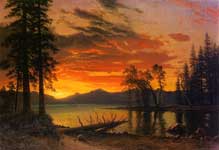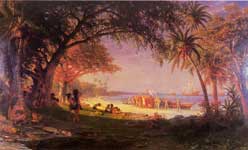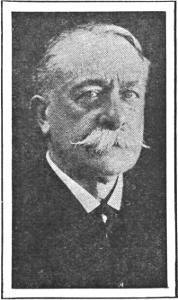Albert Bierstadt
Paintings
Giant Redwood Trees of California
Puget Sound on the Pacific Coast
Sunrise on the Matterhorn
Rocky Mountain Landscape
Mountain Peaks in the Clouds
Rocky Mountain Waterfall
View of Chimney Rock Ohalila .Sioux Village in the foreground
Cloud Study. Moonlight
Merced River. Yosemite Valley
Minnehaha Falls
Lake Lucerne
Among the Sierra Nevada Mountains California
Connecticut River Valley, Claremont, New Hampshire
A Storm in the Rocky Mountains Mt. Rosalie
Farallon Island
Evening in the Mountains
Indian Canoe
Light in the Forest
Rocky Mountain. Big Horn Sheep
Yellowstone Falls
The Wild West
Valley of the Yosemite
Buffalo Trail. The Impending Storm
Butterfly
Matterhorn
Island Lake Wind River Range Wyoming
Sioux Village near Fort Laramie
Home of the Rainbow. Horseshoe Falls. Niagara
California Spring
Winter in Yosemite
Sunset in the Yosemite Valley
Estes Park Colorado Whytes Lake
Indians Spear Fishing
The Lookout
Sunrise on Mount Tacoma
Untitled mountains and lake
Jungfrau
Canadian Rockies. Lake Louise
On the Hudson River Near Irvington
Seal Rock California
Glen Ellis Falls
Street in Nassau
Indians crossing the Columbia River
Rockland County. California
Landscape in the Bahamas
Pink Butterfly
Green Butterfly
Yellow Butterfly
California Spring
Northwest Coast. Loring Bay. Alaska
Bow River Falls. Canadian Rockies
Trapper and Indian Guide on Horseback
Old Faithful
The Waterfalls of San Antonio
San Rafael. California
Lake Scene
Fishing Boats
Deer in Mountain Home
Mount Corcoran
Union Soldiers Fighting in the Field
Lake Tahoe
Outlet at Lake Tahoe
A golden summer day near Oakland
Tropical Coast
Bridal Veil Falls Yosemite Valley California
Wintertime Lake Tahoe in winter the Sierra Nevada California
Sketch for The Last of the Buffalo
The Last of the Buffalo
The Merced River in Yosemite
Alcatraz San Francisco Bay
Autumn Landscape New England
Looking from the Shade on Clay Hill .Sunset Clay Street Hill San Francisco
Mariposa Indian Encampment Yosemite Valley California
Surveyors Wagon in the Rockies
Sunlight and Shadow
On the Sweetwater near the Devil's Gate
On the Hudson
Mountain House
Snow in the Rockies
The Fallen Tree
Cloud Study with two Figures
Valley of the Yosemite
Wind River Country
Deer
The Grizzly Giant Sequoia Mariposa Grove California
Indian Encampment
Summer Snow on the Peaks or Snow Capped Mountains
Boating through Yosemite Valley with Half Dome in the Distance
Estes Park Colorado
A Western Landscape
Roman Fish Market. Arch of Octavius
California Coast
Icebergs
Indian Encampment - Evening
Fishing Boats at Capri
A Wild Stallion
Entrance to the Golden Gate
Buffalo Head
Two Horses
White Horse and Sunset
Cathedral Rock
The Rocky Mountains Landers Peak
Mountain Goats
Landscape with Cattle
Indian Hunters in Canoe
Mountain Lake
Landscape with Sunset and Herder with Cattle
Mountain Landscape
Western Lake Scene
The coming storm
The Falls of Saint Anthony
Beached Ship
Rocky Mountain Goats
Study of Rocky Mountains
Wreck of the Ancon in Loring Bay. Alaska
Mont Blanc
Storm Clouds
Study of Wild Horses
In the Foothills
Monterey California
Trapped
Study of a moose
In the Tyrol
Butterfly
View of Nassau the Bahamas
The Blue Grotto. Capri
Yosemite
Mount Hood. Columbia River
Sunset in California. Yosemite
A Western Waterfall
Rocky Mountain Sheep
Late Afternoon Sun
Pemigewasset River. New Hampshire
Deep in the Rockies
Tottenham Church.London. 1869
Southern Sierra, Mount Whitney Region
Source of the Snake River
The Last of the Buffalo 2
Mountain Brook
Mountain Landscape
River Valley Landscape
Ruins-Campagna of Rome
The Falls Of Saint Anthony
Ruins of Paestum
Ocean Pool Farallon Islands California
View of Mount Rainier with Fishermen
Field of Red and Yellow Wildflowers
Landscape with Trees and Lake
A Path Through the Forest
Path by a Lake in a Fores
Above the Timberline
Sea and Sky
Dunes and Clouds
Evening Sky
Mount Vesuvius at Midnight
White Mountains New Hampshire
Lake Rosalie. California
Italian Costume Studies
Nevada Falls. Yosemite
The Rocky Mountains Landers Peak
Oregon Trail
Hunter in the White Mountains Near Glen House detail
Lake in the Sierra Nevada
In the High Mountains
Sundown at Yosemite
Peaks in the Rockies
View of Glacier Park or Sunset on Peak
Geysers in Yellowstone
Forested hills
Covered wagons
Evening on the Prairie
Mountain landscape
Scene in Yosemite Valley
The Domes of the Yosemite
Cypress Point Monterey
Mountains
Twilight, Lake Tahoe
Landscape with Lake
Lake in Moonlight
Mount Hood, Oregon
Sea Cove

Buffalo Trail. The Impending Storm






Mount Brewer from King's River Canyon, California







Wreck Of The Ancon In Loring Bay. Alaska


Bow River Falls. Canadian Rockies

Northwest Coast. Loring Bay. Alaska



Trapper And Indian Guide On Horseback



Among the Sierra Nevada Mountains, California


A golden summer day near Oakland

A Storm in the Rocky Mountains, Mt. Rosalie



Bridal Veil Falls, Yosemite Valley, California





Estes Park, Colorado, Whyte's Lake





Hunter in the White Mountains Near Glen House (detail)







Island Lake, Wind River Range, Wyoming




Lake Tahoe in winter, the Sierra Nevada, California

Looking from the Shade on Clay Hill

Mariposa Indian Encampment, Yosemite Valley, California






On the Hudson River Near Irvington




Puget Sound on the Pacific Coast




Sioux Village near Fort Laramie


Summer Snow on the Peaks or Snow Capped Mountains




Surveyor's Wagon in the Rockies

The Grizzly Giant Sequoia, Mariposa Grove, California





View of Chimney Rock, Ohalilah Sioux Village in the foreground




The Rocky Mountains, Lander's Peak


Lake Tahoe


Fine Art Prints | Greeting Cards | iPhone Cases | Tote Bags | Clothing | Lifestyle | Beach ...
Albert Bierstadt (January 7, 1830 – February 18, 1902) was an American painter best known for his lavish, sweeping landscapes of the American West. To paint the scenes, Bierstadt joined several journeys of the Westward Expansion. Though not the first artist to record these sites, Bierstadt was the foremost painter of these scenes for the remainder of the 19th century.
ALBERT BIERSTADT

Born in Germany, Bierstadt was brought to the United States at the age of one by his parents. He later returned to study painting for several years in Düsseldorf. He became part of the Hudson River School in New York, an informal group of like-minded painters who started painting along this scenic river. Their style was based on carefully detailed paintings with romantic, almost glowing lighting, sometimes called luminism. An important interpreter of the western landscape, Bierstadt, along with Thomas Moran, is also grouped with the Rocky Mountain School
Biography
Bierstadt was born in Solingen, Germany. The following year, in 1831, his family moved to New Bedford, Massachusetts. At an early age Bierstadt developed a taste for art and made clever crayon sketches in his youth. In 1851, he began to paint in oils.[2]
Map of Bierstadt's journey in 1859 and 1863.
He returned to Germany in 1853 and studied painting for several years in Düsseldorf with members of its informal school of painting. After returning to New Bedford in 1857, he taught drawing and painting briefly, before devoting himself full-time to painting.
In 1858 he exhibited a large painting of a Swiss landscape at the National Academy of Design, which gained him positive critical reception and honorary membership in the Academy.[3] At this time Bierstadt began painting scenes in New England and upstate New York, including in the Hudson River valley. A group of artists known as the Hudson River School portrayed its majestic landscapes and craggy areas, as well as the light affected by the changing waters. .
In 1859, Bierstadt traveled westward in the company of Frederick W. Lander, a land surveyor for the U.S. government, to see those landscapes. He returned to a studio he had taken at the Tenth Street Studio Building in New York with sketches that would result in numerous finished paintings. In 1863 he traveled west again, this time in the company of the author Fitz Hugh Ludlow, whose wife he would later marry. Throughout the 1860s, Bierstadt used studies from this trip as the source for large-scale paintings for exhibition. He continued to visit the American West throughout his career.
During the American Civil War, Bierstadt paid for a substitute to serve in his place when he was drafted in 1863. He completed one Civil War painting Guerrilla Warfare, Civil War in 1862, based on his brief experiences with soldiers stationed at Camp Cameron in 1861.[4] Bierstadt's painting was based on a stereo photograph taken by his brother Edward Bierstadt, who operated a photography studio at Langley's Tavern in Virginia. Bierstadt's painting received a positive review when it was exhibited at the Brooklyn Art Association at the Brooklyn Academy of Music in December 1861. Curator Eleanor Jones Harvey observes that Bierstadt's painting, created from photographs, "is quintessentially that of a voyeur, privy to the stories and unblemished by the violence and brutality of first-hand combat experience."[4]
In 1860, he was elected a member of the National Academy; he received medals in Austria, Bavaria, Belgium, and Germany.[5] In 1867 he traveled to London, where he exhibited two landscape paintings in a private reception with Queen Victoria.[6] He traveled through Europe for two years, cultivating social and business contacts to sustain the market for his work overseas.[6]
A trip to the Yellowstone region in 1871 yielded numerous drawings of the area's geysers and picturesque topography. These works were instrumental in convincing the United States Congress to pass the Yellowstone Park Bill in 1872, thus establishing the first national park in the world. Soon thereafter Congress purchased a large painting from Bierstadt for $10,000. As a result of the publicity generated by his Yellowstone paintings, Bierstadt's presence was requested by every explorer considering a westward expedition, and he was commissioned by the Atchison, Topeka, and Santa Fe Railroad to visit the Grand Canyon for further subject matter.[7]
Rosalie Bierstadt, unknown date.
Bierstadt's technical proficiency, earned through his study of European landscape, was crucial to his success as a painter of the American West. It accounted for his popularity in disseminating views of the Rockies to those who had not seen them.[6] The immense canvases he produced after his trips with Lander and Ludlow established him as the preeminent painter of the western American landscape.[6] Financial recognition confirmed his status: The Rocky Mountains, Lander's Peak, completed in 1863, was purchased for $25,000 in 1865.[8]
Despite his popular success, Bierstadt was criticized by some contemporaries for the romanticism evident in his choices of subject[9] and his use of light was felt to be excessive. His exhibition pieces were brilliantly crafted images that glorified the American West as a land of promise.[10] Bierstadt's choice of grandiloquent subjects was matched by his entrepreneurial flair. His exhibitions of individual works were accompanied by promotion, ticket sales, and, in the words of one critic, a "vast machinery of advertisement and puffery."[11]
His wife was diagnosed with consumption in 1876, and from then until her death in 1893, Bierstadt spent time with her in the warmer climate of Nassau in the Bahamas. He also continued to travel to the West and Canada. In later life, Bierstadt's work fell increasingly out of critical favor. It was attacked for its theatrical tone.[6]
In 1882 Bierstadt's studio at Irvington, New York, was destroyed by fire, resulting in the loss of many of his paintings.[2] By the time of his death on February 18, 1902,[12] the taste for epic landscape painting had long since subsided. Bierstadt was then largely forgotten. He was buried at the Rural Cemetery in New Bedford, Massachusetts.
Interest in his work was renewed in the 1960s, with the exhibition of his small oil studies.[6] The subsequent reassessment of Bierstadt's work has placed it in a favorable context:
The temptation (to criticize him) should be steadfastly resisted. Bierstadt's theatrical art, fervent sociability, international outlook, and unquenchable personal energy reflected the epic expansion in every facet of western civilization during the second half of the nineteenth century.[13]
Bierstadt was a prolific artist, having completed over 500 paintings during his lifetime.[14] Many of these are held by museums across the United States.
Existing work
Main article: List of works by Albert Bierstadt
1855 - The Old Mill
1855 - The Portico of Octavia
1855 - Westphalia
1859 - The Wolf River, Kansas,[15] c. 1859, oil on canvas, Detroit Institute of Arts, Detroit, MI
1861 - Echo Lake, Franconia Mountains, NH,[16] Smith College Museum of Art,[17] Smith College, Northampton, MA
1863 - The Rocky Mountains, Lander's Peak, oil on canvas, Metropolitan Museum of Art, New York City, NY
1864 - Cho-looke, the Yosemite Fall, oil on canvas, Timken Museum of Art, San Diego, CA[18]
1864 - Valley of the Yosemite,[19] oil on paper, Museum of Fine Arts, Boston, MA
1866 - On the Hudson River Near Irvington, 1866-70, oil on paper, Berkshire Museum, Pittsfield, MA
1866 - A Storm in the Rocky Mountains, Mt. Rosalie, oil on canvas, Brooklyn Museum, New York City, New York
1868 - Connecticut River Valley, Claremont, New Hampshire, 1868, oil on canvas, Berkshire Museum, Pittsfield, MA
1868 - In the Sierras,[20] Fogg Museum, Harvard University, Cambridge, MA
1868 - Among the Sierra Nevada, California,[21] Smithsonian American Art Museum, Washington, D.C.
1869 - Glen Ellis Falls, oil on canvas, Zimmerli Art Museum, New Brunswick, NJ
1871 - Domes of Yosemite,[22] c. 1871, St. Johnsbury Athenaeum, St. Johnsbury, VT
1874 - Giant Redwood Trees of California, c. 1874, oil on canvas, Berkshire Museum, Pittsfield, MA
1876 - Mount Corcoran,[23] c. 1876–77, oil on canvas, Corcoran Gallery of Art, Washington, D.C.
1888 - The Last of the Buffalo,[24] oil on canvas, Corcoran Gallery of Art, Washington, D.C.
1889 - Alaskan Coast Range,[25] c. 1889, Smithsonian American Art Museum, Washington, D.C.
1891 - The Last of the Buffalo,[26] c. 1891, vintage photogravure, Valley Fine Art Gallery, Aspen, Colorado
1895 - The Morteratsch Glacier Upper Engadine Valley - Pontresina
Legacy and honors
Bierstadt Lake, Rocky Mountain National Park
Because of Bierstadt's interest in mountain landscapes, Mount Bierstadt and Bierstadt Lake in Colorado are named in his honor. Bierstadt was probably the first European to visit the summit of Mount Evans in 1863, 1.5 miles from Mount Bierstadt.[27] Bierstadt named it Mount Rosa, a reference to both Monte Rosa above Zermatt and, Rosalie Ludlow, his future wife, but the name was changed from Rosalie to Evans in 1895 in honor of Colorado governor John Evans.
In 1998, the United States Postal Service issued a set of 20 commemorative stamps entitled "Four Centuries of American Art", one of which featured Albert Bierstadt's The Last of the Buffalo.[28] In 2008, the USPS issued a commemorative stamp in its "American Treasures" series featuring Bierstadt's 1864 painting Valley of the Yosemite.[29]
Valley of the Yosemite[30] also appears in a scene in Terry Gilliam's 1995 film Twelve Monkeys, accompanied by several doctors singing "Blueberry Hill".[31]
William Bliss Baker, another landscape artist, studied under Bierstadt.
See also
List of Hudson River School artists
List of works by Albert Bierstadt
Edward Bierstadt
History of painting
Western painting
References
"Picturing America's Natural Cathedrals". Tfaoi.com. Retrieved 2012-05-20.
Wilson, James Grant; Fiske, John, eds. (1900). "Bierstadt, Albert". Appletons' Cyclopædia of American Biography. New York: D. Appleton.
"Artist Info". nga.gov.
Harvey, Eleanor Jones (2012). The Civil War and American Art. Smithsonian American Art Museum; Metropolitan Museum of Art. Yale University Press. ISBN 978-0-300-18733-5.
"Bierstadt, Albert". Collier's New Encyclopedia. 1921.
National Gallery of Art
Barringer and Wilton, 250
"Albert Bierstadt: The Rocky Mountains, Lander's Peak (07.123) - Heilbrunn Timeline of Art History - The Metropolitan Museum of Art". metmuseum.org.
"Albert Bierstadt Images". Images.google.com. Retrieved 2012-05-20.
"Among the Sierra Nevada, California by Albert Bierstadt / American Art". si.edu.
Smithsonian American Art Museum
Chisholm, Hugh, ed. (1911). "Bierstadt, Albert". Encyclopædia Britannica 3 (11th ed.). Cambridge University Press.
Howat, John K., editor. American Paradise: The World of the Hudson River School, 284. Metropolitan Museum of Art, New York, 1987. ISBN 9780870994975
Glenda Moore (2004-09-09). "xmission.com". xmission.com. Retrieved 2012-12-19.
"Albert Bierstadt: The Wolf River, Kansas (61.28) — The Detroit Institute of Arts". Dia.org. Retrieved 2013-07-05.
"Echo Lake, Franconia Mountains, New Hampshire / North American / Art of the Americas / Highlights By Category / Collection Highlights / Collections / Smith College Museum of Art - Smith College Museum of Art". Scma.smith.edu. Retrieved 2013-07-05.
"Home / Smith College Museum of Art - Smith College Museum of Art". Smith.edu. Retrieved 2013-07-05.
"Cho-looke, the Yosemite Fall, 1864". Timken Museum of Art.
"Valley of the Yosemite". Retrieved 31 May 2014.
"In the Sierras". Harvard Art Museums. Retrieved 2013-07-05.
"Among the Sierra Nevada, California". Smithsonian American Art Museum. Retrieved 31 May 2014.
"St. Johnsbury Athenaeum>>This Week from the Gallery Archives". Stjathenaeum.org. Retrieved 2013-07-05.
"Mount Corcoran | Corcoran". Collection.corcoran.org. Retrieved 2013-07-05.
"The Last of the Buffalo | Corcoran". Collection.corcoran.org. Retrieved 2013-07-05.
"Alaskan Coast Range". Smithsonian American Art Museum. Retrieved 31 May 2014.
"Valley Fine Art". Valley Fine Art Gallery. Retrieved 2 March 2015.
William Newton Byers, Bierstadt's Visit to Colorado: Sketching for the famous painting Storm in the Rocky Mountains, Magazine of Western History, Vol. XI, No. 3, Jan. 1890; page 237.
"ArtOnStamps.org". ArtOnStamps.org. 2010-07-09. Retrieved 2012-05-20.
"The Postal Store @ USPS.com". Shop.usps.com. 2011-03-28. Retrieved 2012-05-20.
"image of Valley of the Yosemite". Retrieved 2012-12-19.
"Twelve Monkeys (1995)". IMDb.
Further reading
American paradise: the world of the Hudson River school. New York: The Metropolitan Museum of Art. 1987. ISBN 9780870994968.
Anderson, Nancy K. et al. Albert Bierstadt, Art & Enterprise, Hudson Hills Press, Inc.: New York, New York, 1990.
Barringer, Tim and Wilton, Andrew. American Sublime: Landscape Painting in the United States 1820-1880, Princeton University Press, 2002. ISBN 0-691-09670-8
Hendricks, Gordon. Albert Bierstadt, Painter of the American West, Harrison House/Harry N. Abrams, Inc.: New York, New York 1988.
----
Fine Art Prints | Greeting Cards | Phone Cases | Lifestyle | Face Masks | Men's , Women' Apparel | Home Decor | jigsaw puzzles | Notebooks | Tapestries | ...
----
Artist
A - B - C - D - E - F - G - H - I - J - K - L - M -
N - O - P - Q - R - S - T - U - V - W - X - Y - Z
Retrieved from "http://en.wikipedia.org/"
All text is available under the terms of the GNU Free Documentation License

























































































































































































